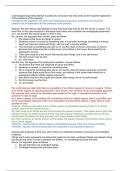Cosmological arguments attempt to justify the conclusion that God exists as the required explanation
of the existence of the universe.
Throughout this argument I will show how cosmological arguments succeed in proving God’s
existence as an explanation for the existence of the universe.
Aquinas’ first and second way attempt to show that God must exist as the first mover or causer. The
word ‘first’ in this case would be in the sense that motion and causation are ontologically dependent
on it, not that the first mover/causer is ‘first’ in time.
His 1st way, the argument from motion, goes as follows:
1. We observe that there are things in motion
2. Whatever moves is moved by something else; it may looks as though something is moving
itself, but these are compound things, and one part is moving another
3. This ismoved by something else and so on, but the chain of movers cannot go on forever
because then there would be no first mover, and without a first mover there would be no
subsequent movers
4. Then there must be a first mover that moved other things, and is not self-moved
5. The first mover must be God
6. So, God exists
His 2nd way, the argument from atemporal causation, runs as follows:
1. we observe that there are instances of cause and effect
2. whatever is caused, is caused by something else
3. this is caused by something else and so on, but the chain of causes cannot go on forever
because then there would be no first cause, and without a first cause there would be no
subsequent effects (infinite regress argument)
4. then there must be a first cause that causes other things, and is not self-caused
5. this first cause must be God
6. so, God exists
We could however object that there is a possibility of an infinite regress of movers or causers. If there
is an infinite regress of objects going back in time forever, then all forms of the cosmological argument
fail, because God could not be ultimately responsible for the origin of causation/movement of the
universe if it had no origin.
As it doesn’t appear to be anything self-contradictory about an infinite regress; then it is possible, and
so the cosmological argument rests on an assumption that the infinite regress is false, when it could
possibly be true.
However, Aquinas would claim that an infinite regress is impossible because if there is an infinite
regress, then time has existed forever.
So, there must be an infinite amount of time before the present moment. That means that to get to the
present moment, an infinite amount of time must have passed. However, an infinite amount of time
cannot pass. No matter how long you wait, you’ll never actually reach infinity.
So, there cannot be an infinite amount of time before the present moment, and therefore there cannot
be an infinite regress.
Therefore, it seems that an infinite regress is impossible because of the very concept of infinity.
Therefore, Aquinas’ first and second way are successful in proving God’s existence.
Aquinas also proposes a third way, which relies on a distinction between necessary and contingent
existence.
Things which exist necessarily are things that could not not exist; contingent things are instead a thing
that would only exist if certain conditions are fulfilled, i.e. something that could not exist.
Hence, his argument goes as follows:
1. We see that there are contingent beings
2. Contingent beings arise and pass away




